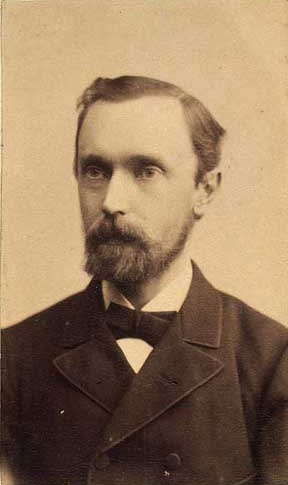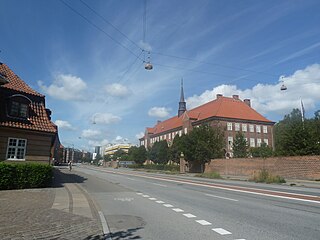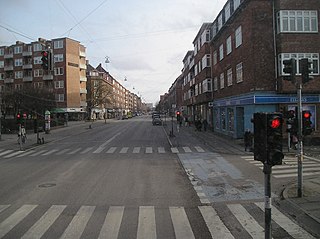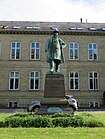
Bernhard Lauritz Frederik Bang, was a Danish veterinarian. He discovered Brucella abortus in 1897, which came to be known as Bang's bacillus. Bang's bacillus was the cause of the contagious Bang's disease which can cause pregnant cattle to abort, and causes undulant fever in humans.
The Royal Veterinary and Agricultural University was a veterinary and agricultural science university in Denmark. It was founded in 1856 and operated until 2007, when it became a part of the University of Copenhagen. It had its headquarters in Frederiksberg, Copenhagen.

Nørrebrogade is the principal shopping street of the Nørrebro district of Copenhagen, Denmark. It runs from The Lakes in the southeast to Nørrebro station in the northwest, linking Frederiksborggade and Queen Louise's Bridge with Frederikssundsvej. The street passes Assistens Cemetery, Nørrebro Runddel and the Superkilen linear park. Buildings include the multipurpose venue Nørrebrohallen and two churches.

Martin Borch (1 March 1852 – 8 February 1937) was a Danish architect.

The Metropolitan University College, also referred to as Metropolitan UC or MUC, is a university college offering a range of bachelor's degree and academy profession degree programmes in Copenhagen, Denmark. All programmes are taught in Danish except for a bachelor's degree in Global Nutrition and Health. A range of courses and modules in English are available to exchange students.
The Faculty of Life Sciences at the University of Copenhagen operated from 2007 to 2012 and was located in Frederiksberg, Denmark.

Frederiksberg Runddel is a space in front of the main entrance to Frederiksberg Gardens, at the end of Frederiksberg Allé, in the Frederiksberg district of Copenhagen, Denmark.

Rolighed is a historic property in the Frederiksberg district of Copenhagen, Denmark. Built in about 1770, it is one of few surviving examples of the summer retreats which dominated Frederiksberg from the late 18th century and until the area was absorbed by the expanding city of Copenhagen in the second half of the 19th century. It is now owned by University of Copenhagen.

Åboulevard is a street in central Copenhagen, Denmark. Together with H. C. Andersens Boulevard in the city centre and Borups Allé, it forms a major artery in and out of the city. The road is built over Ladegårds Å, a canal originally built to supply Copenhagen with water, which still runs in a pipe under it, feeding water into Peblinge Lake.

H. C. Ørsteds Vej is a street in the Frederiksberg district of Copenhagen, Denmark. It runs from Gammel Kongevej in the south to Åboulevard on the border with Nørrebro in the north, linking Alhambravej in the south with Griffenfeldsgade in the north.

Tagensvej is a major street in the northwestern part of inner Copenhagen, Denmark. It runs from Blegdamsvej on the border between Nørrebro and Østerbro in the southeast to Frederiksborgvej and Bispebjerg Cemetery in the northwest.
Bülowsvej is a street in the Frederiksberg district of Copenhagen, Denmark. It runs from Gammel Kongevej in the south to Åboulevard in the north, linking Madvigs Allé with Brohusgade. The University of Copenhagen's Frederiksberg Campus dominates the west side of the street with its large main building from 1895. The east side of the street is home to one of Denmark's oldest neighbourhoods of single family detached homes.
The UCPH School of Veterinary Medicine and Animal Science is part of the Faculty of Health and Medical Sciences at University of Copenhagen (UCPH) in Copenhagen, Denmark. Based at the university's Frederiksberg Campus in Frederiksberg and the Taastrup Campus in the suburb of Taastrup, the school originates in the Royal Veterinary and Agricultural University which was merged into UCPH in 2007. It is the only institution that trains veterinarians in Denmark. The programme is taught in two veterinary teaching hospitals, one at the Frederiksberg Campus and one for large animals in Taastrup.
Taastrup Campus is a university campus operated by University of Copenhagen (UCPH) in Taastrup on the western outskirts of Copenhagen, Denmark. The campus is home to space-consuming activities of the School of Veterinary Medicine and Animal Science and the Department of Plant and Environmental Sciences whose Section for Crop Sciences along with experimental fields, greenhouses and an extensive pometum.
The UCPH Department of Geosciences and Natural Resource Management is a department under the Faculty of Science at University of Copenhagen (UCPH).

Rosenørns Allé is a street located on the border between Frederiksberg and Nørrebro, on the west side of The Lakes, in Copenhagen, Denmark. The street branches from the south side of the busy thoroughfare Kampmannsgade-Åboulevard at the west end of the embankment which separates St. Jørgen's Lake from Peblinge Lake, runs west to Julius Thomsens Plads and then continues in a more northwesterly direction to Bülowsvej where it turns into Rolighedsvej and later Godthåbsvej before reaching Bellahøj in Brønshøj.

Godthåbsvej is a street in the northwestern part of Copenhagen, Denmark. It begins at Bülowsvej in Frederiksberg as the direct continuation of Rosenørns Allé/Rolighedsvej and passes through Vanløse before reaching Bellahøj in Brønshøj. A metro station on the Copenhagen Metro City Circle Line is located at Aksel Møllers Have.

Peter Bangs Vej is a 2.2 km long street in Frederiksberg, a city in the Copenhagen area on the island of Zealand, Denmark. The direct continuation of Smallegade, it initially runs west, from Nordre Fasanvej, but then turns south along the east side of Damhus Lake to meet Roskildevej. There is a large sports complex on the south end of the street with the football club F.C. Copenhagen's training facilities as well as the multi-purpose venue K.B. Hallen.

Hostrups Have is a famous functionalist housing estate and associated green space located at the corner of Falkoner Allé and Rolighedsvej in the Frederiksberg district of Copenhagen, Denmark. Designed by Danish architect Hans Dahlerup Berthelsen in 1935–36. Hostrups Have is named after the playwright Jens Christian Hostrup. It has its own post code.

Rolighedsvej is a street in the Frederiksberg district of Copenhagen, Denmark. It runs from Falkoner Allé in the northwest to Bülowsvej in the southeast, linking Godthåbsvej with Rosenørns Allé. The street is dominated by the University of Copenhagen's Frederiksberg Campus. It takes its name after Rolighed, a Rococo-style country house from 1770 which is now owned by the university.


























